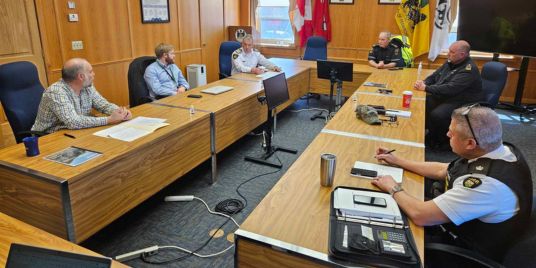

Mayor Ron Gervais and City of Pembroke staff met today with community health agencies to gain an understanding of current strategies and potential future actions to support at-risk populations in the community.
At the call of Mayor Gervais, representatives from the Renfrew County and District Health Unit, County of Renfrew Paramedic Service and Ontario Provincial Police were at the table to discuss the current situation of increased overdoses and suspected deaths from overdoses in the area.
The strong sentiment from the group was the desire to work collaboratively in response, prevention, and education initiatives for people affected by drug use and for the public.
The City will be moving into an enhanced readiness state, and will continue to monitor any impact to operations. With these enhanced operations, the City and local community health agencies will increase their ongoing outreach, and will also work together on targeted outreach to the at-risk population.
The group also committed to continue meeting with the City regularly to ensure the discussion and education carries on.
As has been communicated by the Renfrew County and District Health Unit, friends and family members as well as individuals who use street drugs can work together to reduce the risk of an overdose by putting the following measures in place:
- Don’t use alone. If you overdose and are with someone, they can get urgent help.
- Carry naloxone (Narcan®). Naloxone can temporarily reverse an opioid overdose and kits are available for free throughout Pembroke at local pharmacies and other locations.
- Don’t mix drugs with other drugs or alcohol, as it puts you at higher risk of overdosing.
- Go slow; the quality of street drugs is unpredictable. If you are using street drugs, start by using in small amounts (testers or test doses) to check the strength of what you are using.
- Know your tolerance. Risk of overdose increases if you are a new user or have not used in three or more days.
- If you have no other choice than to use alone, always call the Overdose Prevention Hotline (1-888-688-6677) to have someone standing by to call for help if needed. A volunteer will check in periodically and call 9-1-1 if there’s no response.
Understanding the signs of an overdose can help to save a life. These signs can include, but are not limited to:
- Person can’t be woken up.
- Breathing is slow or has stopped.
- Snoring or gurgling sounds.
- Fingernails and lips turn blue or purple.
- Pupils are tiny or eyes are rolled back.
- Body is limp.
It is possible an individual treated with naloxone may have a re-emergence of the opioid overdose once the naloxone wears off since the duration of action of most opioids exceeds that of naloxone. All overdoses are a medical emergency and calling 9-1-1 is an important step in saving someone’s life.
Support is available; the Renfrew County Addiction Treatment System delivers assessment, counselling, and treatment programs to individuals who use substances. For members of the community requiring mental health services as a result of this current situation and recent events, please use local resources including Mental Health Services of Renfrew County (613-732-8770 ext. 8005, crisis line: 1-866-996-0991) and Pembroke Regional Hospital’s Mental Health Services (1-800-991-7711).
